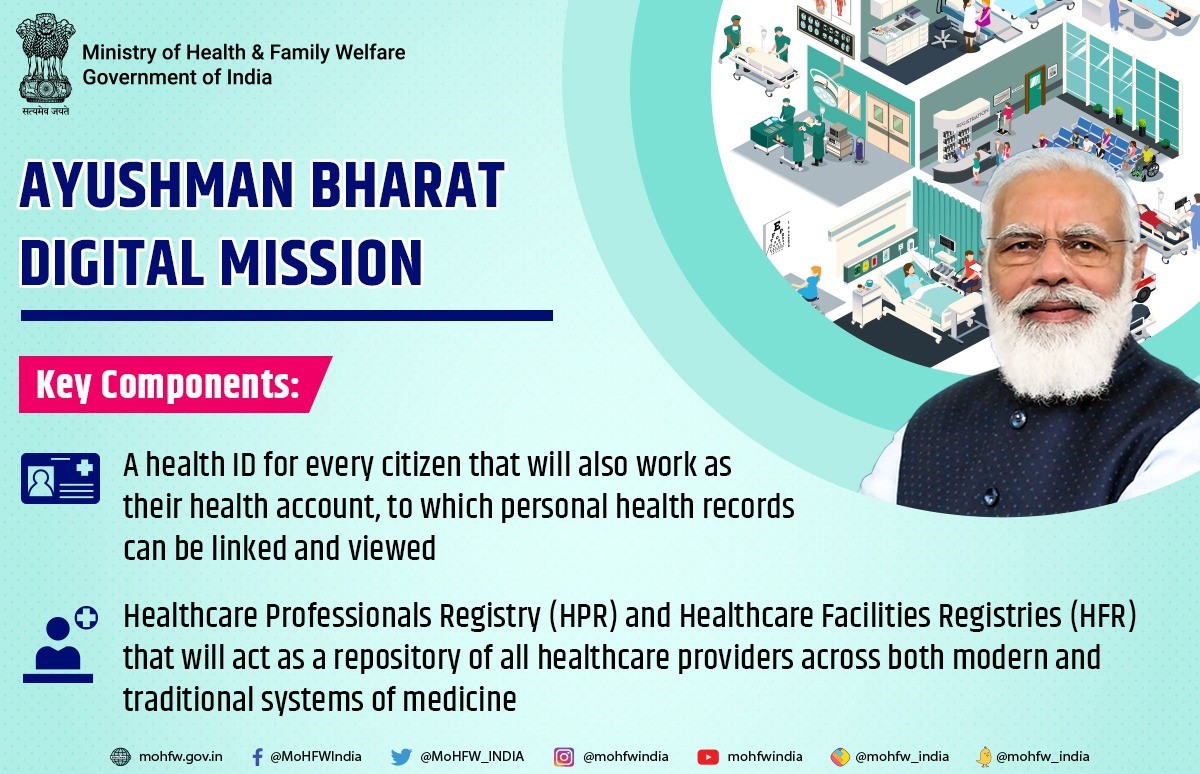NHA extends digital health incentive scheme till Dec. 31
Context
The Ayushman Bharat Digital Mission (ABDM)’s Digital Health Incentives Scheme (DHIS) will now run through December 31, according to an announcement made by the National Health Authority (NHA) on Friday.
What is Ayushman Bharat Digital Mission (ABDM)?

- Purpose: The National Health Authority (NHA) launched the ABDM program intending to develop an ecosystem for digital health in India. To increase accessibility and delivery of healthcare across the nation, it aspires to digitize healthcare facilities and services.
- Targeted Facilities: ABDM is made to assist hospitals, clinics, diagnostic centres, laboratories, and other healthcare facilities in implementing digital health solutions.
- Benefits for Citizens: The main objective of ABDM is to ensure that all Indian citizens have access to the advantages of digital health, ensuring effective and seamless healthcare services.
- Growth Potential: Although the use of digital health records has increased significantly, there is still room for growth because a sizable share of healthcare services are still provided in non-digital form.
- Incentivization: The NHA decided to offer incentives to participants in the digital health ecosystem to promote the adoption of digital health practices.
What is the role of the Digital Health Incentive Scheme (DHIS) in ABDM?
- Purpose: The ABDM initiative’s DHIS program intends to provide incentives for healthcare providers and suppliers of digital health solutions to encourage the adoption of digital health practices.
- Effective Date: The DHIS went into effect on January 1, 2023, which means healthcare institutions and solution providers can begin taking part in the program as of that time.
- Policy Update: The NHA updated its DHIS policy to give stakeholders in the digital health ecosystem more incentives.
- Eligibility: Participation in the DHIS is open to all medical facilities that have registered with the Health Facility Registry (HFR) and Digital Health Solution Providers (DSCs).
- Incentive Amount: The amended DHIS policy offers eligible healthcare facilities and solution providers the chance to receive an incentive of up to 4 crore rupees.
- Transaction limitations: To better facilitate the expansion of digital health transactions, the amended policy also included several leniencies, such as lower transaction limitations in the current system.
- Encouragement of Adoption: The DHIS wants to encourage healthcare professionals to adopt digital health practices and inspire vendors of digital health solutions to make their software available at a reasonable price.
- Improved Healthcare Ecosystem: The NHA seeks to develop India’s digital health ecosystem by encouraging stakeholders to adopt digital health practices.
How can Ayushman Bharat Digital Mission (ABDM) and the Digital Health Incentive Scheme (DHIS) offer advantages for citizens in India?
- Enhanced Accessibility: Digital health projects give people remote access to healthcare, which aims to make healthcare more accessible. Especially for people residing in rural or remote regions with little healthcare infrastructure, it enables them to effortlessly visit doctors, obtain medical records, and seek health information.
- Efficient Healthcare Services: Healthcare services that are efficient in terms of waiting periods, paperwork, and administrative headaches are provided via digital health solutions. Healthcare services may be delivered to citizens more quickly and effectively, improving the patient experience.
- Better management of health records: Digital health records make it easier to store patient data centrally and securely. With higher data accuracy, fewer medical errors, and access to thorough patient histories, healthcare providers may make more accurate diagnoses and treatment choices.
- Better Health Monitoring: People can regularly monitor their health and follow their vital signs thanks to digital health solutions like wearable technology and health apps. This gives people the power to actively manage their health and well-being.
- Healthcare Services are Better Integrated: The use of digital health solutions encourages more effective integration of various healthcare services. As a result, patients will benefit from a more integrated healthcare system where information can be quickly shared between various healthcare professionals to guarantee continuity of care.
Overall, the implementation of digital health practices via ABDM and DHIS has the potential to completely alter the Indian healthcare system by giving people better access to medical services, better health outcomes, and more control over their health and well-being.




